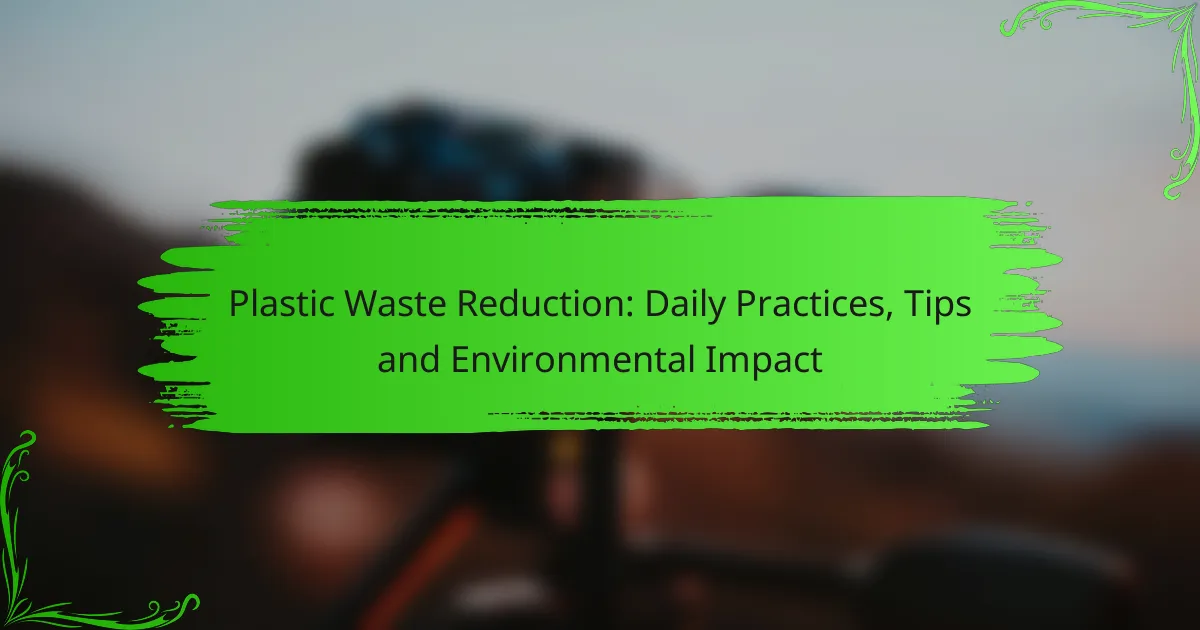Reducing plastic waste is crucial for protecting our environment and health. By incorporating simple daily practices, such as using reusable bags and containers, individuals can significantly lessen their plastic footprint. These small changes not only contribute to a healthier planet but also promote sustainable living in our communities.
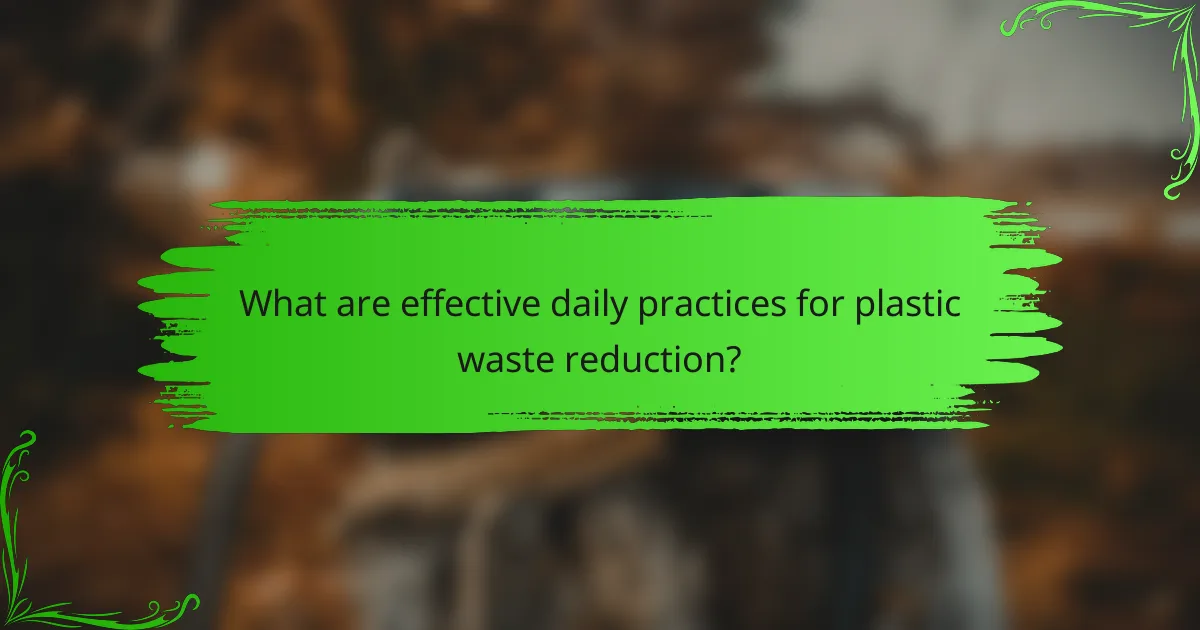
What are effective daily practices for plastic waste reduction?
Effective daily practices for plastic waste reduction include adopting habits that minimize plastic use and promote sustainable alternatives. By making small changes in your routine, you can significantly decrease your plastic footprint and contribute to a healthier environment.
Using reusable bags
Switching to reusable bags is one of the simplest ways to reduce plastic waste. Instead of relying on single-use plastic bags, consider using cloth or other durable materials that can be washed and reused many times.
Keep reusable bags in your car or by the door so you remember to take them when shopping. Many stores now offer discounts for customers who bring their own bags, making this practice both environmentally friendly and cost-effective.
Composting organic waste
Composting organic waste helps divert food scraps and yard waste from landfills, reducing the need for plastic waste associated with disposal. By composting, you can create nutrient-rich soil for gardening while minimizing plastic packaging from food items.
Start a compost bin at home or check for local composting programs. Many municipalities offer curbside composting services, making it easier to participate without additional effort.
Choosing bulk products
Buying in bulk is an effective way to cut down on plastic packaging. Many stores offer bulk sections for grains, nuts, and other staples, allowing you to purchase only what you need without excess plastic wrapping.
Bring your own containers to fill with bulk items, which not only reduces plastic waste but can also save you money. Look for stores that encourage this practice and check if they have a rewards program for bulk purchases.
Opting for glass or metal containers
Choosing glass or metal containers instead of plastic ones can significantly reduce your plastic consumption. These materials are more durable and can be reused for years, making them a sustainable choice for food storage and transportation.
Consider replacing plastic food storage containers with glass jars or stainless steel containers. They are often safer for food storage and can be recycled at the end of their life cycle, unlike many plastics.
Participating in local clean-up events
Joining local clean-up events is a proactive way to combat plastic waste in your community. These events help remove litter from parks, beaches, and streets, raising awareness about plastic pollution and its impact on the environment.
Look for community organizations or environmental groups that organize clean-ups. Participating not only helps the environment but also connects you with like-minded individuals who are committed to reducing plastic waste.
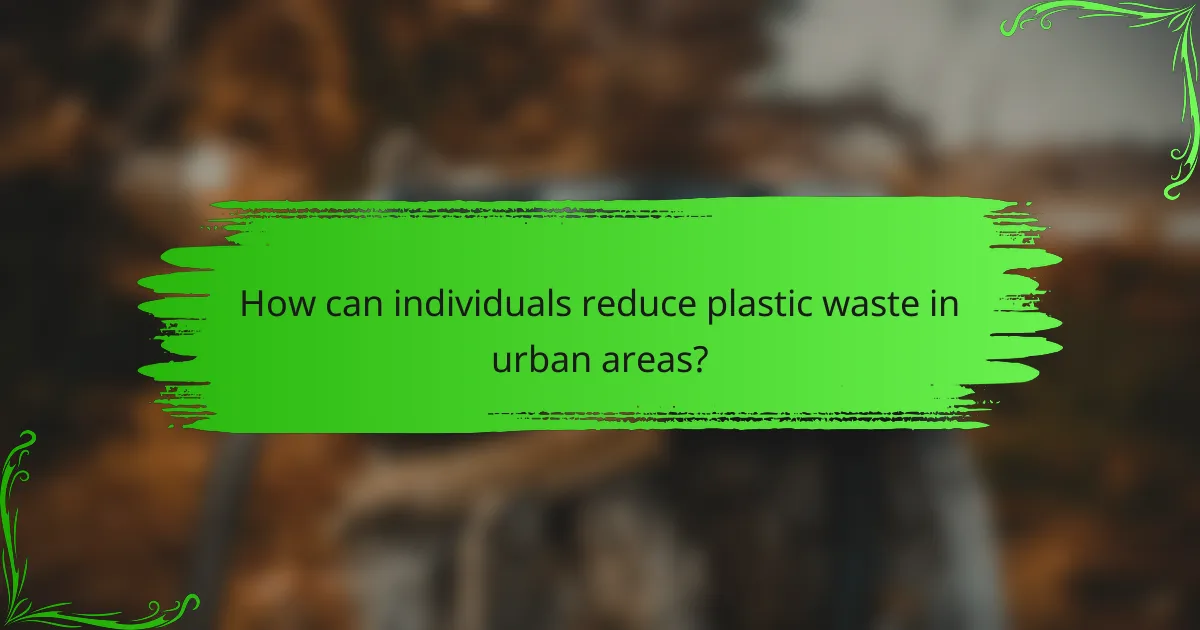
How can individuals reduce plastic waste in urban areas?
Individuals can significantly reduce plastic waste in urban areas by adopting sustainable practices in their daily lives. Simple changes, such as using reusable bags and containers, can lead to a noticeable decrease in plastic consumption.
Utilizing public transportation
Using public transportation is an effective way to reduce plastic waste associated with personal vehicles. Buses and trains often have lower carbon footprints and require less energy per passenger compared to cars. By choosing public transit, individuals can minimize their reliance on single-use plastics, such as water bottles and snack wrappers, that often accompany car travel.
Additionally, many urban areas offer incentives for public transit use, such as reduced fares or monthly passes, which can save money while promoting eco-friendly habits. Consider carrying a reusable water bottle and snacks in a container to further limit plastic waste during your commute.
Supporting local zero-waste stores
Shopping at local zero-waste stores helps reduce plastic waste by providing bulk products without packaging. These stores often encourage customers to bring their own containers, which can significantly cut down on single-use plastics. Look for items like grains, nuts, and cleaning supplies that can be purchased in bulk.
Moreover, supporting these businesses fosters a community focused on sustainability. Many zero-waste stores also offer workshops on reducing plastic use, making them a valuable resource for learning practical tips and tricks.
Engaging in community recycling programs
Participating in community recycling programs is crucial for reducing plastic waste in urban areas. These programs help ensure that recyclable materials are properly processed instead of ending up in landfills. Many cities have specific guidelines on what can be recycled, so it’s essential to familiarize yourself with local regulations.
Consider volunteering for local clean-up events or educational initiatives that promote recycling awareness. Engaging with your community not only helps reduce plastic waste but also builds a network of like-minded individuals committed to environmental sustainability.
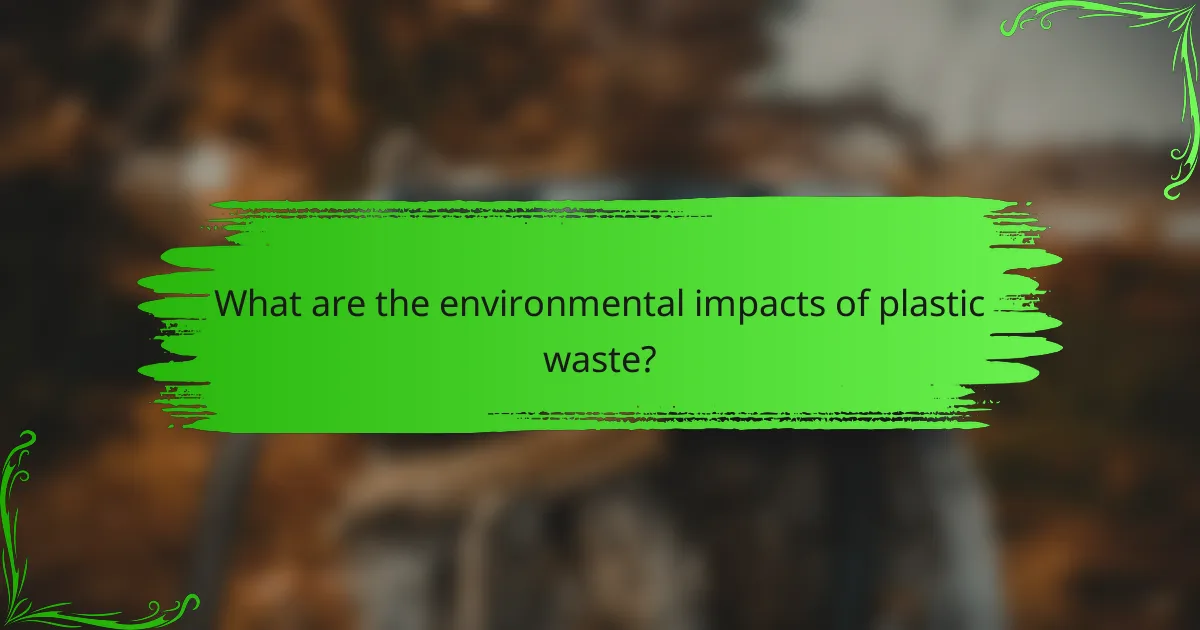
What are the environmental impacts of plastic waste?
Plastic waste significantly harms ecosystems, wildlife, and human health. It persists in the environment for hundreds of years, leading to various detrimental effects that require urgent attention.
Effects on marine life
Plastic waste poses severe risks to marine life, with millions of animals affected each year. Sea creatures often ingest plastic debris, mistaking it for food, which can lead to malnutrition, internal injuries, or death.
Additionally, entanglement in plastic items, such as fishing nets and six-pack rings, can cause injury or drowning. Coral reefs, vital marine ecosystems, are also negatively impacted as plastic pollution can smother them and disrupt their growth.
Contribution to land pollution
Plastic waste contributes significantly to land pollution, affecting soil quality and local ecosystems. When plastics break down, they release harmful chemicals that can leach into the ground, contaminating water supplies and harming plant life.
Landfills filled with plastic waste can take up valuable space and emit greenhouse gases as they decompose. Communities often face challenges in managing these waste sites, leading to further environmental degradation.
Impact on human health
The impact of plastic waste on human health is increasingly concerning. Microplastics, tiny plastic particles that result from the breakdown of larger items, have been found in food and drinking water, raising questions about their long-term health effects.
Exposure to certain chemicals in plastics, such as bisphenol A (BPA) and phthalates, has been linked to hormonal disruptions and various health issues. Reducing plastic waste can help mitigate these risks and promote a healthier environment for all.
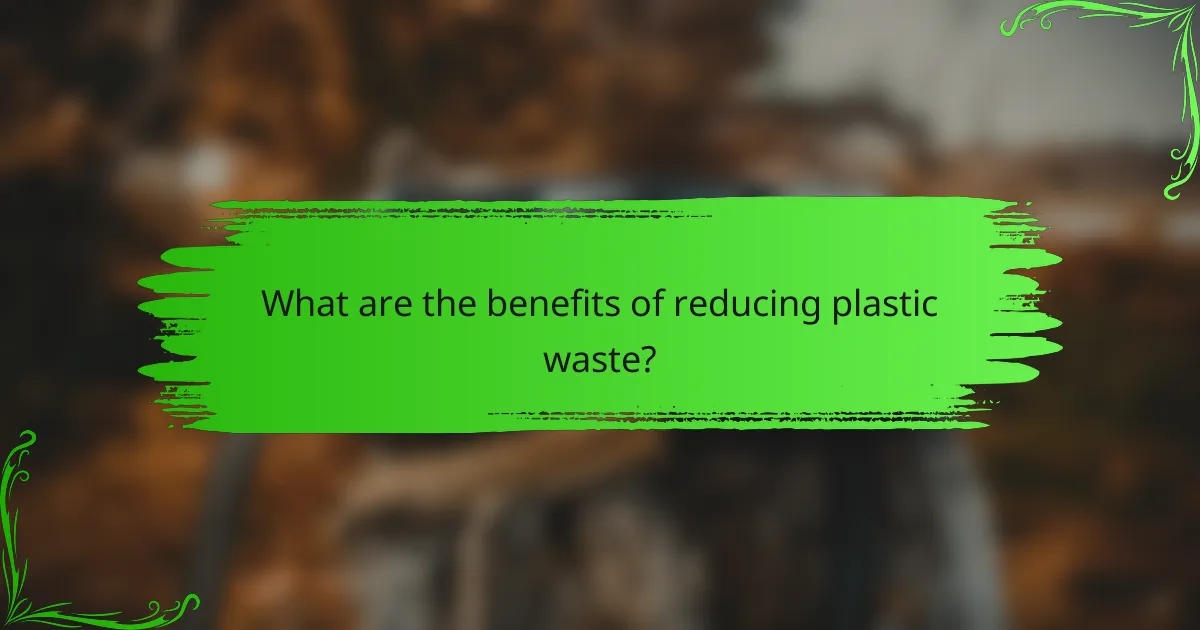
What are the benefits of reducing plastic waste?
Reducing plastic waste offers significant environmental and health benefits, including a decrease in pollution and a healthier ecosystem. By minimizing plastic use, individuals and communities can contribute to a more sustainable future and enhance their quality of life.
Lowering carbon footprint
Reducing plastic waste directly contributes to lowering your carbon footprint. The production and disposal of plastic generate substantial greenhouse gas emissions, so using less plastic can significantly decrease these emissions. For example, opting for reusable bags instead of single-use plastic bags can reduce the carbon impact associated with their production and disposal.
Additionally, choosing products with minimal or no plastic packaging can further lower your carbon footprint. Consider supporting local businesses that prioritize sustainable practices, as this often results in lower transportation emissions and a smaller overall environmental impact.
Conserving natural resources
Reducing plastic waste helps conserve valuable natural resources such as petroleum, water, and energy. The production of plastic is resource-intensive, requiring significant amounts of fossil fuels and water. By minimizing plastic use, you can help preserve these resources for future generations.
Simple actions like using refillable containers or purchasing products with eco-friendly packaging can make a difference. Look for items made from recycled materials, as they often require less energy and resources to produce compared to new plastic products.
Improving community health
Reducing plastic waste can lead to improved community health by decreasing pollution and exposure to harmful chemicals. Plastics can leach toxic substances into the environment, affecting air and water quality. By cutting down on plastic use, communities can create cleaner, healthier living spaces.
Encouraging local initiatives, such as community clean-up events or plastic-free challenges, can foster a culture of sustainability and health. Engaging in these activities not only reduces plastic waste but also strengthens community bonds and promotes awareness of environmental issues.
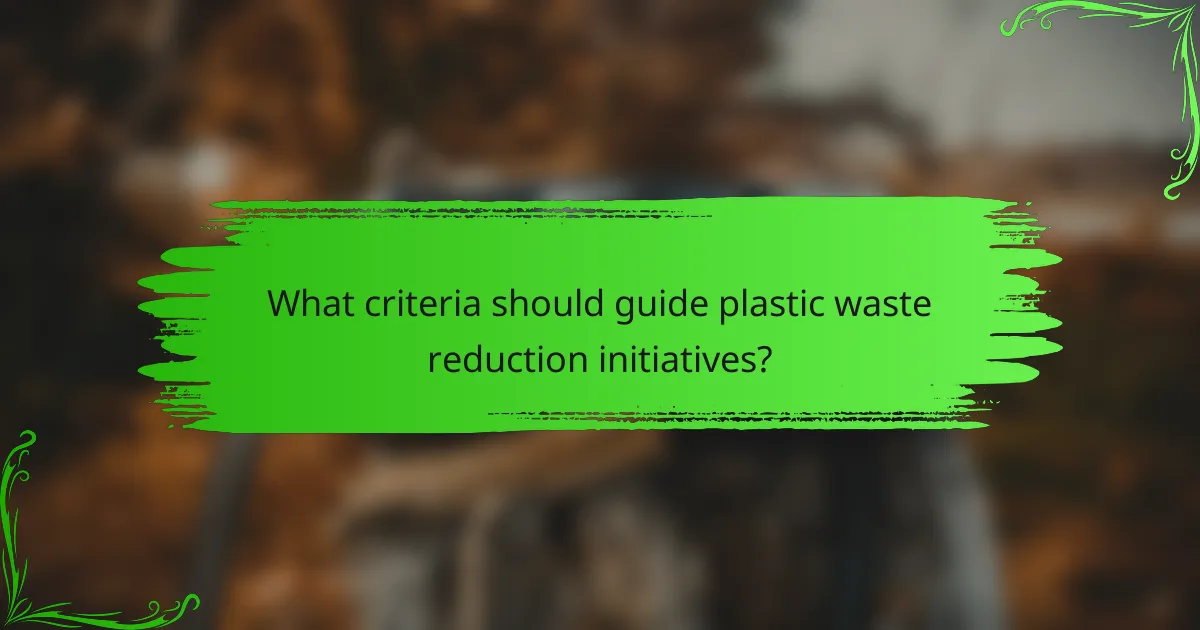
What criteria should guide plastic waste reduction initiatives?
Effective plastic waste reduction initiatives should focus on sustainability, community involvement, and compliance with local regulations. Key criteria include assessing existing waste management systems, encouraging public participation, and evaluating the environmental impact of proposed actions.
Assessing local waste management policies
Understanding local waste management policies is crucial for any plastic waste reduction initiative. These policies dictate how waste is collected, processed, and recycled, influencing the effectiveness of reduction efforts. Review regulations regarding plastic disposal, recycling facilities, and any incentives for reducing plastic use.
For example, some municipalities may offer financial rewards for businesses that minimize plastic packaging, while others might impose penalties for excessive waste. Familiarizing yourself with these policies can help tailor initiatives that align with local goals and resources.
Evaluating community engagement
Community engagement is vital for the success of plastic waste reduction initiatives. Assess how well the community understands the importance of reducing plastic waste and identify existing programs that promote awareness and participation. Surveys and public meetings can provide insights into community attitudes and behaviors regarding plastic use.
Encouraging local involvement through workshops, clean-up events, and educational campaigns can foster a sense of ownership and responsibility. Successful initiatives often include partnerships with local organizations to amplify outreach and impact, ensuring that efforts resonate with the community’s values and needs.
